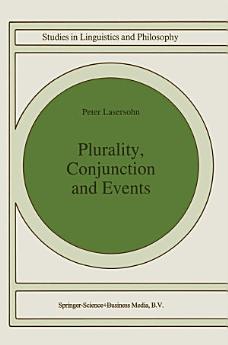Plurality, Conjunction and Events
P. Lasersohn
ມ.ນ. 2013 · Studies in Linguistics and Philosophy ຫົວທີ 55 · Springer Science & Business Media
ປຶ້ມອີບຸກ
308
ໜ້າ
reportບໍ່ໄດ້ຢັ້ງຢືນການຈັດອັນດັບ ແລະ ຄຳຕິຊົມ ສຶກສາເພີ່ມເຕີມ
ກ່ຽວກັບປຶ້ມ e-book ນີ້
Plurality, Conjunction and Events presents a novel theory of plural and conjoined phrases, in an event-based semantic framework. It begins by reviewing options for treating the alternation between `collective' and `distributive' readings of sentences containing plural or conjoined noun phrases, including analyses from both the modern and the premodern literature. It is argued that plural and conjoined noun phrases are unambiguously group-denoting, and that the collective/distributive distinction therefore must be located in the predicates with which these noun phrases combine. More specifically, predicates must have a hidden argument place for events; the collective/distributive distinction may then be represented in the part/whole structure of these events. This allows a natural treatment of `collectivizing' adverbial expressions, and of `pluractional' affixes; it also allows a unified semantics for conjunction, in which conjoined sentences and predicates denote groups of events, much like conjoined noun phrases denote groups of individuals.
ໃຫ້ຄະແນນ e-book ນີ້
ບອກພວກເຮົາວ່າທ່ານຄິດແນວໃດ.
ອ່ານຂໍ້ມູນຂ່າວສານ
ສະມາດໂຟນ ແລະ ແທັບເລັດ
ຕິດຕັ້ງ ແອັບ Google Play Books ສຳລັບ Android ແລະ iPad/iPhone. ມັນຊິ້ງຂໍ້ມູນໂດຍອັດຕະໂນມັດກັບບັນຊີຂອງທ່ານ ແລະ ອະນຸຍາດໃຫ້ທ່ານອ່ານທາງອອນລາຍ ຫຼື ແບບອອບລາຍໄດ້ ບໍ່ວ່າທ່ານຈະຢູ່ໃສ.
ແລັບທັອບ ແລະ ຄອມພິວເຕີ
ທ່ານສາມາດຟັງປຶ້ມສຽງທີ່ຊື້ໃນ Google Play ໂດຍໃຊ້ໂປຣແກຣມທ່ອງເວັບຂອງຄອມພິວເຕີຂອງທ່ານໄດ້.
eReaders ແລະອຸປະກອນອື່ນໆ
ເພື່ອອ່ານໃນອຸປະກອນ e-ink ເຊັ່ນ: Kobo eReader, ທ່ານຈຳເປັນຕ້ອງດາວໂຫຼດໄຟລ໌ ແລະ ໂອນຍ້າຍມັນໄປໃສ່ອຸປະກອນຂອງທ່ານກ່ອນ. ປະຕິບັດຕາມຄຳແນະນຳລະອຽດຂອງ ສູນຊ່ວຍເຫຼືອ ເພື່ອໂອນຍ້າຍໄຟລ໌ໄໃສ່ eReader ທີ່ຮອງຮັບ.







